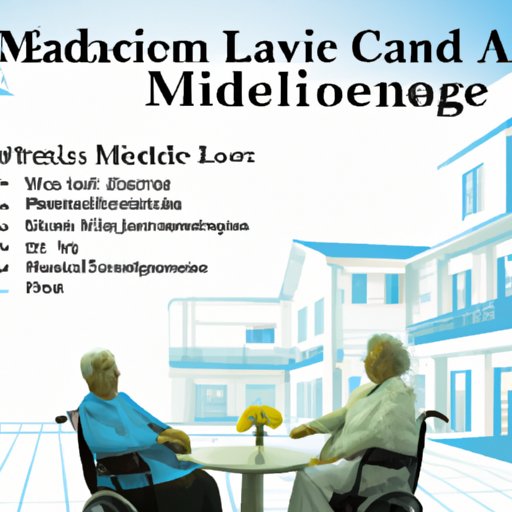Introduction
Assisted living costs can be a significant financial burden for individuals and their families. This article looks at whether or not Medicare will help cover these costs, as well as what other options are available. It is important to understand what types of coverage may be available in order to determine the best way to fund assisted living expenses.
Overview of Medicare and Assisted Living Costs
Medicare is the federal health insurance program for people 65 years of age and older, as well as certain younger people with disabilities. It is administered by the Centers for Medicare & Medicaid Services (CMS). The program provides coverage for hospital services, doctor visits, preventive care, and prescription drugs.
Assisted living is a type of residential facility that provides care for individuals who need assistance with daily activities such as eating, bathing, dressing, and medication management. Assisted living typically costs between $3,000 and $5,000 per month.
Exploring the Different Types of Medicaid Coverage for Assisted Living
Medicaid is a joint federal-state program that provides health coverage to low-income individuals and families. In certain states, Medicaid may provide coverage for some of the costs associated with assisted living. The type of coverage available will vary from state to state, so it is important to check with your local Medicaid office to find out what is covered in your area.
There are two types of Medicaid coverage for assisted living: traditional Medicaid and waiver programs. Traditional Medicaid is available to individuals who meet certain income and asset limits. Waiver programs are designed to help individuals transition from nursing homes back into the community. These programs provide additional services and supports that are not typically covered under traditional Medicaid.

Breaking Down How Medicare Covers Assisted Living Costs
Medicare does not cover the cost of room and board in assisted living facilities. However, it may cover some medical services provided in an assisted living facility, such as physical therapy, occupational therapy, and speech therapy. Medicare also may cover some home health care services if they are medically necessary.
It is important to note that there are limitations on what Medicare will cover for assisted living costs. Medicare will only cover medically necessary services, and the services must be ordered by a doctor and provided by a Medicare-approved provider. Additionally, Medicare will not pay for any services that are considered custodial care, such as help with bathing, dressing, or eating.
Examining Eligibility Requirements for Medicare to Cover Assisted Living Costs
In order to be eligible for Medicare coverage of assisted living costs, an individual must meet certain criteria. Generally, the individual must be 65 years of age or older, or have certain disabilities or illnesses. In addition, the individual must be a U.S. citizen or permanent resident, and must be enrolled in a Medicare Part A and/or Part B plan.
There are also specific eligibility requirements for certain types of services. For example, home health care services must be ordered by a doctor and provided by a Medicare-approved home health agency. Additionally, physical therapy, occupational therapy, and speech therapy must be provided by a Medicare-certified therapist.

Investigating What Alternatives are Available to Fund Assisted Living Costs
If Medicare does not cover the cost of assisted living, there are several other options that may be available. Long-term care insurance is an option for those who have purchased a policy. This type of insurance typically covers the cost of assisted living and other long-term care services.
Private pay options are also available. These include paying out of pocket, using funds from retirement accounts or investments, or taking out a loan. Veterans may also be eligible for assistance through the Department of Veterans Affairs, which may provide coverage for some of the costs associated with assisted living.

Comparing Medicare Coverage for Assisted Living Costs to Other Options
When comparing Medicare coverage for assisted living costs to other options, it is important to consider the cost, services provided, and eligibility requirements. Medicare coverage will vary depending on the individual’s situation, and it is important to understand what is and is not covered before making a decision. Private pay options may be more expensive, but they may also provide more flexibility in terms of services and eligibility. Long-term care insurance may provide more comprehensive coverage, but it is important to understand the details of the policy. Finally, veterans may be eligible for assistance through the VA, which may provide coverage for some of the costs associated with assisted living.
Conclusion
In conclusion, it is important to understand the different types of coverage available for assisted living costs. Medicare does not cover the cost of room and board, but it may cover some medical services provided in an assisted living facility. There are also other options available, such as long-term care insurance, private pay options, and veterans assistance benefits. Each of these has its own set of eligibility requirements and costs, so it is important to compare them before making a decision.
For individuals and families seeking assistance with assisted living costs, it is important to explore all available options and understand the details of each one. Doing so will help ensure that the most suitable option is chosen and that the individual receives the best possible care.
(Note: Is this article not meeting your expectations? Do you have knowledge or insights to share? Unlock new opportunities and expand your reach by joining our authors team. Click Registration to join us and share your expertise with our readers.)
